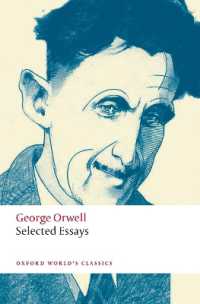- ホーム
- > 洋書
- > 英文書
- > Cinema / Film
Full Description
Known as the 'Georgian Socrates' of Soviet philosophy, Merab Mamardashvili was a defining personality of the late-Soviet intelligentsia. In the 1970s and 1980s, he taught required courses in philosophy at Russia's two leading film schools, helping to educate a generation of internationally prolific directors.
Exploring Mamardashvili's extensive philosophical output, as well as a range of recent Russian films, Alyssa DeBlasio reveals the intellectual affinities amongst directors of the Mamardashvili generation - including Alexander Sokurov, Andrey Zvyagintsev and Alexei Balabanov. This multidisciplinary study offers an innovative way to think about film, philosophy and the philosophical potential of the moving image.
Contents
Acknowledgements
Notes on Transliteration
Introduction: The Freest Man in the USSR
Chapter One: Alexander Sokurov's Demoted (1980): Consciousness as Celebration
Chapter Two: Ivan Dykhovichnyi's The Black Monk (1988): Madness, Chekhov, and the Chimera of Idleness
Chapter Three: Dmitry Mamuliya's Another Sky (2010): The Language of Consciousness
Chapter Four: Alexei Balabanov's The Castle (1994) and Me Too (2012): Kafka, the Absurd, and the Death of Form
Chapter Five: Alexander Zeldovich's Target (2011): Tolstoy and Mamardashvili on the Infinite and the Earthly
Chapter Six: Vadim Abdrashitov and Alexander Mindadze's The Train Stopped (1982): Film as a Metaphor for Consciousness
Conclusion: Andrey Zvyagintsev's Loveless (2017): The Philosophical Image and the Possibilities of Film
Bibliography
Appendix








